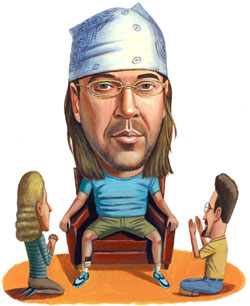 | |
 Now playing: Slate V, a video-only site from the world's leading online magazine. Visit Slate V at www.slatev.com. Now playing: Slate V, a video-only site from the world's leading online magazine. Visit Slate V at www.slatev.com. | |
assessment David Foster Wallace Why he inspires such devotion in his fans. Posted Thursday, April 21, 2011, at 12:06 PM ET
It is not at once clear how Wallace's work has reached this level of esteem. In a chronically fickle marketplace for serious fiction, his long, slippery, painfully frank books stand out mostly for their crags and challenges: A reader encountering the mature DFW for the first time will find a swell of nonlinear narrative, a patina of academic argument (a favorite gambit: "I submit ..."), and a thatch of lengthy and digressive footnotes. The man himself--underdressed, overinformed, speaking with the halting care of someone used to leaning on the backspace key--stood out as a flamboyant nebbish even in a nebbish-packed profession. Lots about Wallace's style and subjects portend critical success, but almost nothing projects popularity. Why has he earned the sort of following that usually flows to genre writers and canonized masters? To continue reading, click here. Nathan Heller is a Slate copy editor. He also writes the magazine's "Assessment" column. Follow him on Twitter.Join the Fray: our reader discussion forum What did you think of this article? POST A MESSAGE | READ MESSAGES Also In Slate The Libertarian Who Could Be the Next Ron Paul, Except for One Thing: Ron Paul Does Wonkette Deserve To Be Boycotted After Its Jokes About Trig Palin? Peer-to-Peer Lending Is Finally Here, and It Could Make You a Lot of Money | Advertisement |
Manage your newsletters subscription: Unsubscribe | Forward to a Friend | Advertising Information | |
Ideas on how to make something better? Send an e-mail to slatenewsletter@nl.slate.com. Copyright 2011 The Slate Group | Privacy Policy | |
Culturebox: David Foster Wallace
Subscribe to:
Post Comments (Atom)

No comments:
Post a Comment